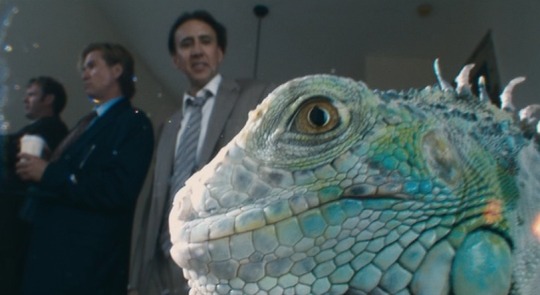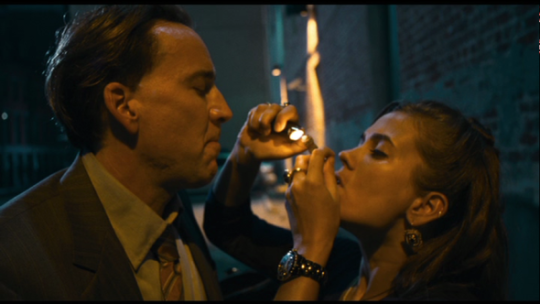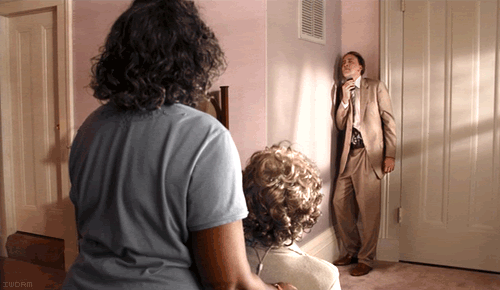From Script to Screen: The Strange Alchemy of Bad Lieutenant: Port of Call New Orleansby Soheil Rezayazdi
By Yasmina Tawil

The word iguana doesnt appear in the shooting script of Bad Lieutenant: Port of Call New Orleans. And why should it? Written by veteran TV writer William Finkelstein, the script unfolds with the cause-and-effect logic of a tight police procedural. Prior to penning Bad Lieutenant, Finkelstein wrote more than 50 episodes of L.A. Law, created and wrote on Brooklyn South, and contributed to such cop show staples as Law & Order and NYPD Blue. The man knows how to write a coherent crime drama. Hes devoted his career to the genre, mastering its plot points and character arcs for network television.
So why, in Bad Lieutenant, does a routine scene of police surveillance devolve into a full minute of shaky close-ups of iguanas? Why do scenes end with mystifying non-sequiturs like Shoot him again…his soul is still dancing? Why does its protagonist enter a bar shouting, Sup! Sup! Sup, motherfucker! for no reason? And why does he aim a gun at an old ladys head and seethe Maybe you should drop dead, you selfish cunt! long after a director should have shouted cut?
William Finkelstein wrote none of that. His script originated in the early 2000s as a New York-set TV pilot. Over time, he reworked the materialfirst into a feature, then into a New Orleans noir. He finished revisions on the script in 2008 as the film was in production. The final script, which he sent me prior to our recent meet-up at an Italian bakery in the West Village, bears the signature of a police procedural master craftsman. Over espressos and lemon ices, I implored Finkelstein to discuss the brazen changes made to his script by the erratic tag team of Nicolas Cage and director Werner Herzog.
Our discussion, along with a close look at the unpublished shooting script, reveals how many of Bad Lieutenants most singularly strange moments were born.
I always wanted to pull back to the procedural nature [of the script], Finkelstein said, and Werner basically didnt give a shit about any of that.
—
Bad Lieutenant: Port of Call New Orleans is a true curiosity. Neither a remake nor a sequel to Abel Ferraras 1992 Bad Lieutenant, the film attempts to turn that films premisea cop with a severe drug probleminto a franchise. Finkelstein likened the connection between his film and Ferraras to the Bond series. From Russia with Love is not a sequel to Dr. No, he said. Its a different movie with different bad guys and settings, but theres a character in the midst of itwhos played by different people over the yearswho has certain traits that make James Bond James Bond.
And so the refined Bond martini, shaken not stirred, becomes the bump of coke before work, the hit of crack with your local dealer, the shot of heroin to end the night. Take your pick. Both bad lieutenants love it all. Not surprisingly, theres no word yet on a third installment to a film franchise whose trademarks include hardcore drug use, gambling debts, and sexual bribery.
The 2009 film is a gleeful exercise in provoking head scratches, raised eyebrows, dropped jaws. Where to start? That a Nic Cage cop drama is the biggest budgeted film of Werner Herzogs career? Or how about its supporting cast, a grab bag of the formerly famous (Val Kilmer, Fairuza Balk, Xzibit) that gives the film its straight-to-video flavor? Or maybe we focus on the title, Bad Lieutenant: Port of Call New Orleans, a name as indecisive and unwieldy as the film itself?

Above all, though, we have the enchanting interplay between three distinct voices: Herzog, Cage, and Finkelstein. The three operate as something of a jazz trio Finkelstein keeps time while Herzog and Cage solo over his material. Each player takes turns taking control of whats on screen. Cage brings the Tourettic outbursts of a repressed superstar unchained. Herzog injects the film with lyrical (and often very goofy) interludes. And Finkelstein gives contrast to his partners more self-indulgent noodling. Together, the three dont exactly harmonize; their agendas clash on the screen, birthing moments of wondrous strangeness. You either dig the contrapuntal pleasures, or you hear nothing but noise.
This piece focuses on the films noisiest moments: those flashes of improvisation and left-field obsession smuggled into Bad Lieutenant. I select four scenes where the film erupts into delicious chaos. These are the scenes where a genre picture, penned by an industry veteran, morphs into a kind of madness no screenwriter could dream up.
—
Youre the fucking reason this countrys going down the drain!
A police officer investigates a homicide while battling his own demons. Bad Lieutenant, for all its digressions, hinges on a fairly straightforward premise. As the films tagline cutely puts it, the only criminal Lt. Terence McDonagh cant catchis himself. Our protagonist stumbles around New Orleans, getting into all kinds of trouble, as he gathers evidence against the likely perp, a local drug dealer named Big Fate (Xzibit). McDonagh has shades of the great stoner detectivesThe Dude, Doc Sportello, Altmans Philip Marloweonly he doesnt shy away from conflict; he seeks it out like a commuter with low blood sugar.
His biggest meltdown arrives in a luxury nursing home. McDonaghs there to interrogate Binnie, a nursing home assistant, on the whereabouts of her grandson. In the script, he badgers Binnie and a patient in her care, an elderly woman in a wheelchair. Binnie refuses to talkuntil McDonagh cuts off the patients oxygen supply. Aghast, Binnie gives up her grandsons location. McDonagh reattaches the oxygen tubes, having extracted the information he needs to move the plot forward, and leaves. End scene.
This two-page exchange runs a sadistic three minutes in Bad Lieutenant. The unscripted touches start right away: Cage hides behind the old ladys bedroom door as she enters, surreally shaving with an electric razor. He attacks this material with the whisper-or-scream volatility of his famed freakouts. Dialogue-wise, he sticks to Finkelsteins words for the first two minutes, drawing out lines like Children…were executed for maximum menace. From there, he transforms the moment into macabre humor. Cage introduces a gun into the scene, shoving it up against Binnies temple as he fumes, Where the fuck is he? Once he gets his answer, Cage extends the scene with a virtuoso verbal assault on the old lady. Maybe you should drop dead you selfish cunt! he erupts after a few seconds of silence.

Its too much to print here in full. You can find it in any Nic Cage supercut worth your time.




